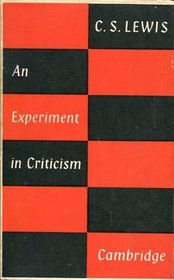An Experiment in Criticism

First edition
|
|
| Author | C. S. Lewis |
|---|---|
| Country | England |
| Language | English |
| Subject | Criticism |
| Publisher | Cambridge University Press |
|
Publication date
|
1961 |
| Media type | |
| Pages | 142 |
| ISBN | |
| OCLC | 1018690 |
| 801.9 | |
| LC Class | LCC PN85.L48 |
An Experiment in Criticism is a 1961 book by C. S. Lewis in which he proposes that the quality of books should be measured not by how they are written, but by how they are read. To do this, the author describes two kinds of readers. One is what he calls the "unliterary", and the other the "literary". He proceeds to outline some of the differences between these two types of readers. For example, one characterization of an unliterary reader is that the argument "I've read it before" is a conclusive reason not to read a book. In contrast, literary readers reread books many times, savoring certain passages, and attempting to glean more from subsequent readings.
Lewis also argued that judging books by whether they are "lowbrow" or "highbrow" is not necessarily fruitful; many "lowbrow" books prove to be valuable to a literary reader willing to approach without prejudgment. He noted that books classified as "lowbrow", such as science fiction, are also capable of inducing a passion to re-read and imparting experience which changes reader's worldview. Lewis suggests that books which are capable of doing this may prove to have enduring merit regardless of their genre of origin. He suggested that attempting to judge the literary merit of books based on traditional criteria may not prove fruitful.
Thus, Lewis suggests that a quality book is one that someone, anyone will re-read. A highbrow view that such a book is poor quality has failed to appreciate whatever qualities merit re-reading by someone.
...
Wikipedia
